- Home
- Avery Aster
The Paper Year Page 3
The Paper Year Read online
Page 3
At 10:00 a.m. is your typical Upper East Side slightly neurotic somewhat narcissist who enjoys talking about herself, why she isn’t married, how men disappoint her, why she should date someone with money, how her boss at work hates her, why her sister isn’t talking to her anymore, how her mother drives her up a wall, why she wants to ten pounds, how she won’t be going to the Hamptons this summer, why she wants to get her liposuction done, and so on. For the third time, mind you. My professional recommendation is to hire a personal trainer and skip the psychotherapy.
Sure, I could sit here and take people’s money. Don’t get me wrong, many of my colleagues do, but I don’t. My motto, the one I advertise all over town and have written two self-help books on, is that you should be cured of your negative thoughts and destructive behavior patterns within a year of talk therapy. Hence my coined slogan of ‘Give me a year and I’ll get you happy. Let’s talk.’
Cheesy? Totally. Regardless, it works.
The reality is that change is hard, especially when it involves human behavior, but if you work at it daily, and see a therapist weekly, you should be a better version of yourself within twelve months. And if you aren’t, then you don’t really want to change. You’d be amazed; some people get off on being miserable. Not me!
This brings me to my 11:00 a.m. appointment, Keely Brock. Today is her last session with me. After ten months of therapy she’s fully recovered from her compulsive overeating. These types of sessions make me happy. Any patient who recovers from their demons and goes out into society as a productive adult with a healthy mind is a win for my practice.
“How do you feel about ending therapy?” I ask.
“Excited. Nervous,” she replies, smoothing her pencil skirt over her curvy hips. With a mixture of cognitive therapy, hypnotherapy and having a sponsor, Keely’s lost over a hundred pounds. “Piper, are you ever friends with your patients after treatment?”
“No,” I respond quickly.
Her face sours.
“I’m always here if you need me, Keely. You have my cell, so you may call or text, and you’ll be coming in every few months for maintenance—or as I like to call it, a mental tune-up.”
Keely snorts and crosses her legs, allowing her right sandal to dangle off her big toe.
“I know making new friends after your marriage ended is hard. But keep putting yourself out there, attend those social groups we talked about. You’ll get there.”
When her marriage imploded a few years ago—she walked in on her husband with her best friend—she’d turned to food for comfort. Roughly fifteen percent of all obese women between the ages of forty-five and sixty-five are addicted to what they eat, making food addicts harder to treat than heroine junkies and alcoholics combined.
She nods, wiping a shimmering tear from her right eye.
“What’s on your agenda for this spring?” I change the topic.
“I’m teaching three classes.” With an undergrad degree in forensic science and a PhD in chemistry, Keely is an astute professor at Havemeyer College of Criminal Justice, known simply as HCCJ or just Havemeyer.
Pressing my back into the Herman Miller chair, I ask, “That’s a heavy workload for you, isn’t it?”
She nods. “One of the classes is on fingerprint technology. I can teach it with my eyes closed.”
“I bet.”
“The college lab is working to create a new laser scanner that can pick up the fingerprints with just one quick swipe on any surface,” she boasts proudly.
“Really?”
“Any fiber or textile.”
“Paper?” I ask.
“Of course.”
Leaning forward, it occurs to me how I can find out who wrote that letter. “Keely, hypothetically speaking, if given a letter, you can determine who touched it?”
She nods. Her sandal, the one she’d been dangling off the top of her foot, hits the floor with a loud thud. “As long as the person is in the system’s database.”
“You mean a criminal?”
“Not exactly. Fingerprints are taken for a variety of reasons. Anytime someone needs a background check, such as when getting a new job, securing clearance at work, enrolling in a new school, immigration, and so forth.”
“How long are the fingerprints stored?”
“Usually, in our database at the school, about few years.” She pauses. “Why?”
“Just curious.”
We talk a bit more about her dating and putting herself out there. She’s booked on a singles cruise later this summer. We discuss her abandonment issues from her childhood after her parents divorced, her father leaving the picture at a young age, and why she later clung so strongly to the men she dated.
Naturally, since I was in and out of the foster care system as a child, I can relate to everything Keely says. But I don’t tell her that. I never reveal anything about myself to my patients or relate my own life experiences to them verbally. Come to think of it, I don’t talk much about my childhood with anyone, not even Bo. It’s too painful—my mother’s substance abuse, new foster parents, the burning desire to help and fix everyone involved. A childhood like mine would make most folks go insane. Not me. I just chose to work with the mentally ill, probably because, deep down inside, in my truest core, helping others makes me feel better about my past, and thus in a way helps me.
My mind goes back to the fingerprints. Could she find out who wrote that letter?
“Piper, are you listening to me?”
Forcing a tight smile, I snap out of my own head.
“Are you okay? I just told you that I had anal sex with Bradley Cooper and you didn’t seem phased.”
“What?” I laugh.
“I was trying to see if you were paying attention. Clearly you weren’t. I guess you’re done with me,” she says sarcastically.
“Sorry. I was thinking about what you said earlier in regards to fingerprints.”
“Why?”
“If I gave you a sheet of paper, could you test it?”
“I’d be happy to.” Her blue eyes flicker with excitement, perhaps seeing this as a gateway to a new friendship. It’s not. Don’t get me wrong, Keely would be a wonderful person to have in my life, but she’s now a former patient and I never cross boundaries. Although, what I’m asking her to do might open a Pandora’s box. How do I explain to her what the note says? With the hour coming to an end, I realize I’ll have to come up with an excuse later.
“Can we meet tonight after work? I can give you the letter then. It’s important that I get this done as soon as possible.”
She reaches into her purse and hands me her card. “I’m in room 507. My last class ends at six.”
“I’ll be there.” For the first time since this whole nightmare started, I feel as though I’m gaining a sense of control over what happened to me. Bo and Dr. Teisto may not believe me, but I’ll prove them wrong. I’m sure of it.
Canceling my last appointment for the day, I bolt home to get that suicide letter. Upon entering the apartment, the smell of dog waste smacks my nostrils. Sure enough, on the white tile floor in the kitchen is a pile just waiting for me. I glare over at Orlane’s water bowl and note that it’s dry.
Odd. Reid didn’t come.
Quickly I take Orlane out for a walk around the block. I apologize for leaving him alone all day. I don’t have time to find a dog walker this week. I’ll just have to use my lunch break to walk him. I don’t mind. I love spending time with Orlane. He’s my Zen.
After I feed him, clean up the mess, light a candle, and open the windows, I go to the bedroom to get the letter. Only it’s not on the dresser where I left it. I check the nightstand, shoe closet, living room, and kitchen. No sign of it anywhere. I text Bo: Where’s the letter? He immediately replies, In the trash.
Typical. My husband is obsessed with throwing things out. His housekeeping philosophy is to toss anything that hasn’t been used in the last three months. He had no pictures or photos from his life in albums
, no alumni books, no notes or diplomas from his past. Just a season of clothing, a few books, and that’s pretty much it. When we first started dating I thought it was odd, but now I’m used to it. He likes things clean and simple, which is hard because I’m a bit of a hoarder. Most kids who grow up with nothing are.
I grab a pair of yellow rubbery dish gloves from the kitchen sink and head out. In the elevator I press the B button. We live on the first floor, also known as the garden level. Below our floor is a two-story underground parking garage, and then below that is a basement where tenants can store things in their assigned cages. It’s also where the trash goes.
Turning the corner, I pinch my nostrils in an attempt to avoid the rancidness coming back at me. It’s ten times worse than what Orlane had left me. Filled with mostly white and black plastic bags of garbage, broken furniture, a white sneaker stained gray and missing its mate, I scan the room, searching for our bag. It’ll be easy to spot because ours are green; an expensive biodegradable plastic that allows me to rest on my recycling laurels.
I don’t see it.
Over my shoulder, the sound of someone coming down the hall grows louder. I turn to see Carmine, his face wrinkled into confusion.
“Mrs. Adler, what are you doing down here?
“Bo accidently threw something out this morning and I need to find it.”
He points to the other side of the room and says, “First floor trash comes out of the shoot, landing over there.”
I thank him while scavenging through the pile of waste.
The tightness in my chest subsides the second I spot the brightly colored bag. I grab it, tear off the binding closure, and spot the letter.
“I’ve never seen anyone so happy to see trash before.” Amused, he chuckles as I take the sheet of paper out and toss the rest of the trash back to where it lay.
We ride in the elevator up to the first floor, passing the parking garage.
“Is it true that starting in a few weeks, folks won’t be allowed to park their cars in there anymore?”
He nods. “The subway will be using this space for the train.”
“I’m not looking forward to that explosion.”
He laughs, glances down at the paper as if he’s never seen it before, and comments, “Must be an important letter.”
Surely it’s familiar to him. After all, Carmine is the one who found me unconscious.
“It’s the letter from that night I got sick. Don’t you remember seeing it on the nightstand?”
“No, ma’am.” The red in his colorful face flashes to white.
“When you called 911, you did it from the bedroom?”
He nods. “I used the phone next to your bed.”
“And you don’t remember seeing this letter next to the phone on that nightstand?”
“So much happened. I might’ve.”
Just to be clear, I ask one more time, holding it up for him to read.
“Suicide?” His voice cracks in surprise.
“That’s what the doctors say.”
“I thought you got food poisoning,” he says matter-of-factly.
“So did I.” Grabbing his arm, I feel sane for the first time in days.
He walks me to the front door of my apartment and pauses, glancing at Reid’s newspapers. “Mr. Tremont hasn’t come out once today.”
“I know. He didn’t walk Orlane like he usually does. I’m worried. What if he’s hurt in there?”
“He’s fine. I heard him playing Depeche Mode earlier.”
“‘Personal Jesus’?” I ask, knowing Reid’s taste in music.
He nods.
“You’ve been with the building a long time, haven’t you?”
“Twenty-three years come November. I’ve raised a family and put two kids through college with this job.”
“That’s amazing, Carmine. Your kids must be so proud of you.” He’d immigrated to the US from Sicily when he was a small child.
“We do what we can.”
“How long has Reid lived at the Barclay?”
“Hmmm. Let me think.” His eyes flip up to the ceiling as if counting in his head before he says, “Nine years. He was young, just finished college. His parents bought him the place. I remember because the board made them be a guarantor.”
“And during that time, have you ever known Reid to do this before, to lock himself up and not answer the door?”
He shakes his head, steps closer to Reid’s door, and gives it a loud, heavy knock. “Mr. Tremont? Are you okay?”
No reply.
I come up behind him, pressing my ear to heavy oak wood. My mind races with possible scenarios. One of them being whoever tried to kill me has succeeded in murdering Reid.
Wait. I hear him on the other side of the door.
Sobbing.
“Reid, I know you’re standing there. What’s the matter? If you don’t open the door, Carmine is going to get the keys and let himself in.”
“Please, leave me alone,” Reid cries out from the other side of the door.
My heart sinks. “Are you okay? Do you need anything? Can I do anything for you?”
“Just go. I need to be alone.” Reid’s footsteps grow faint as he walks away from the door. I hear another door inside his apartment close.
“I don’t like to get involved in my neighbors’ business. Who the fuck does? I mean we all have drama, right? But for whatever reason, the Barclay makes Real Housewives lame. From cheating husbands to nosy neighbors who get off on watching their friends fall on their face, the Upper East Side isn’t an easy place to reside. I feel for Piper, I really do. But I have to stay out of it. What her hubby does is none of my business. I wonder if I’d feel that way if Boden wasn’t so damn attractive. It’s easy to hate ugly people, but men who look like Boden… well, they could just get away with murder.” –Reid Tremont, illustrator, 80s music lover, and raging top.
Doing as Reid asked, I let go of the knob and we step away from his front door.
Frustrated, Carmine puts his hands up in the air as if he doesn’t know what to make of the situation. I follow him into the dimly lit lobby.
“Promise me you’ll keep an eye on him,” I say, taking some cash out of my purse that I’d gotten earlier in the day from the bank and slipping it into his hand.
“Of course, ma’am.”
On the Upper East Side, the doorman does more than just get the door. They make our lives run smoothly, from accepting our packages, mail, dry cleaning and visitors. They need to be properly motivated for all that.
I walk to the end of 72nd Street and hail a cab going south on Second Avenue. Normally I’d take Uber, though lately I haven’t loved the way their CEO has been behaving socially, so I deleted the app from my iPhone. Human behavior can affect how consumers shop, especially when a brand is built around a specific individual.
“Corner of 64th and Madison,” I say to the middle-aged driver who’s texting in one hand while holding the wheel with the other.
Usually, I’d walk over to the Plaza Athénée, where I’m meeting Keely, but I’m running late. The situation with Reid put me ten minutes behind schedule. Glancing down at my Tiffany watch, I realize more like fifteen. As we head across town, I rehearse in my mind how I’m going to explain my need for fingerprints.
Wishing Boden had called the police when he found the note, a hot flash of anger comes over me, causing me to nervously lick my lips. I press my head into the back of the seat, close my eyes, and think what the outcome would’ve been if he had.
Given my personal history, the NYPD probably still would’ve believed I tried to kill myself. The thought of being judged for my past mistakes makes my stomach ache. Then I realize I’d done it a moment ago with Uber. Is anyone perfect? No. Not really. Don’t we all deserve a second chance? Maybe.
As we pull up to the hotel, the car lurches to a stop. I swipe my Visa debit card through the meter to pay the fare, then step out of the cab and make my way into the Plaza Athénée.
>
The only commercial building on a street lined with private townhomes, this hotel is the ideal hideaway from the nosy Upper East Siders. The guests who stay here are usually European businessmen in town to work with the local art galleries and furniture showrooms in the area. Unlike the Carlyle or St. Regis, the Plaza Athénée isn’t visited much by American tourists looking to see the sights. And lastly, the locals who do live in the area usually have cocktails at the Mark, a more ‘seen and be seen’ venue.
Decked in a soft pastel dress, different than the one she’d worn earlier, Keely is all glossy smiles, sitting in the corner lounge just before the Arabelle Restaurant, which takes up the back of the first floor. I wave a hello, encouraging her to stay seated, no need to get up.
“Thank you for seeing me tonight,” I say, taking the bench across from her. I notice her nails have changed from the French manicure she had at my office to something deep and sparkly. Her makeup is much heavier than I’ve seen before, as if she’s going out on the town. She’s already ordered a martini. I try not to frown; I really didn’t want to have a girl’s night out, nor a cocktail with her, but I didn’t see any other option. I order a dry Hendricks gin martini with a twist from the tall waiter who speaks with a French accent. I wonder if it’s real or much like the fake Louis XIV, XV, and XVI furniture in the lobby.
“To your abstinence,” I say, congratulating her on not binge eating as we clang our glasses, then take a sip. The gin burns my throat a little, reminding me of my recent trip to the hospital.
Not wasting time, I get straight to the point, pulling a large manila envelope out of my Birkin. “Inside is a piece of paper. It should have my fingerprints, which are already in the system from my job. My husband’s, whose fingerprints are also in the system from his past military experience. And possibly someone else’s.”
“Do you have a specific person in mind? Maybe an age range or sex?”
I shake my head and hand her the envelope.
She places it next to her on the bench. “It’ll take me a few days to get to the lab, but once I’m there, I should have the results for you pretty quickly. That is, of course, assuming everyone is in the database.”

 Undressed
Undressed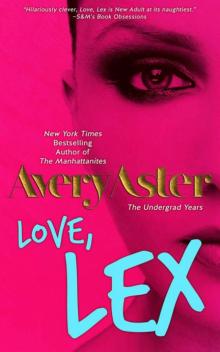 Love, Lex
Love, Lex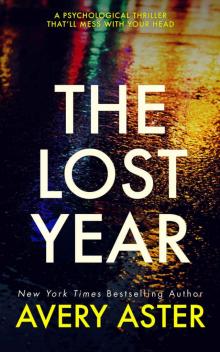 The Lost Year
The Lost Year Unique
Unique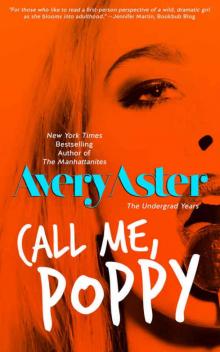 Call Me, Poppy
Call Me, Poppy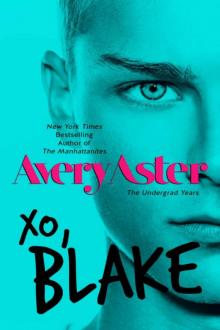 XO, Blake
XO, Blake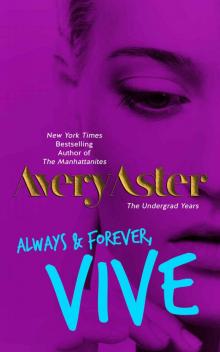 Always & Forever, Vive
Always & Forever, Vive A Manhattanite's Christmas
A Manhattanite's Christmas Yours Truly, Taddy
Yours Truly, Taddy Unsaid
Unsaid Unscrupulous
Unscrupulous Unconventional
Unconventional Uncensored
Uncensored Undercover
Undercover Unlucky
Unlucky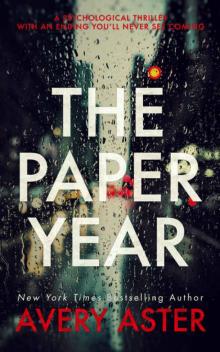 The Paper Year
The Paper Year Unless
Unless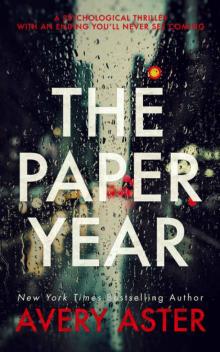 The Paper Year: A Psychological Thriller With An Ending You'll Never See Coming (Piper Adler #1)
The Paper Year: A Psychological Thriller With An Ending You'll Never See Coming (Piper Adler #1) Unique (The Manhattanites Book 6)
Unique (The Manhattanites Book 6) Uncensored (The Manhattanites Book 7)
Uncensored (The Manhattanites Book 7) Undercover (The Manhattanites Book 8)
Undercover (The Manhattanites Book 8)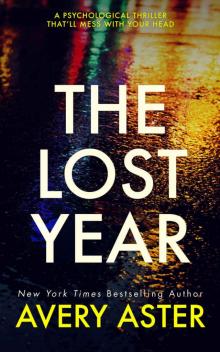 The Lost Year: A Psychological Thriller That'll Mess With Your Head (Piper Adler Book 2)
The Lost Year: A Psychological Thriller That'll Mess With Your Head (Piper Adler Book 2)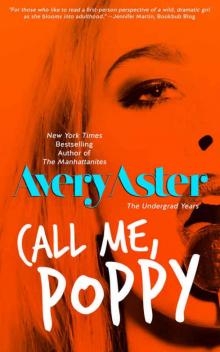 Call Me, Poppy (The Undergrad Years #5)
Call Me, Poppy (The Undergrad Years #5) Uncensored (The Manhattanites #7)
Uncensored (The Manhattanites #7)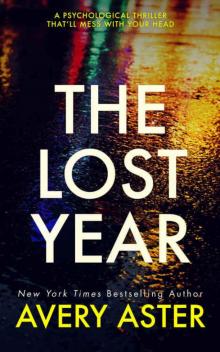 The Lost Year: A Psychological Thriller That'll Mess With Your Head (Piper Adler #2)
The Lost Year: A Psychological Thriller That'll Mess With Your Head (Piper Adler #2) Unless (Jagger & Poppy Book 2)
Unless (Jagger & Poppy Book 2) The Bad Boys of Eden
The Bad Boys of Eden Unique (The Manhattanites #6)
Unique (The Manhattanites #6) Unconventional (The Manhattanites #4)
Unconventional (The Manhattanites #4) Unlucky (Jagger & Poppy Book 3)
Unlucky (Jagger & Poppy Book 3)